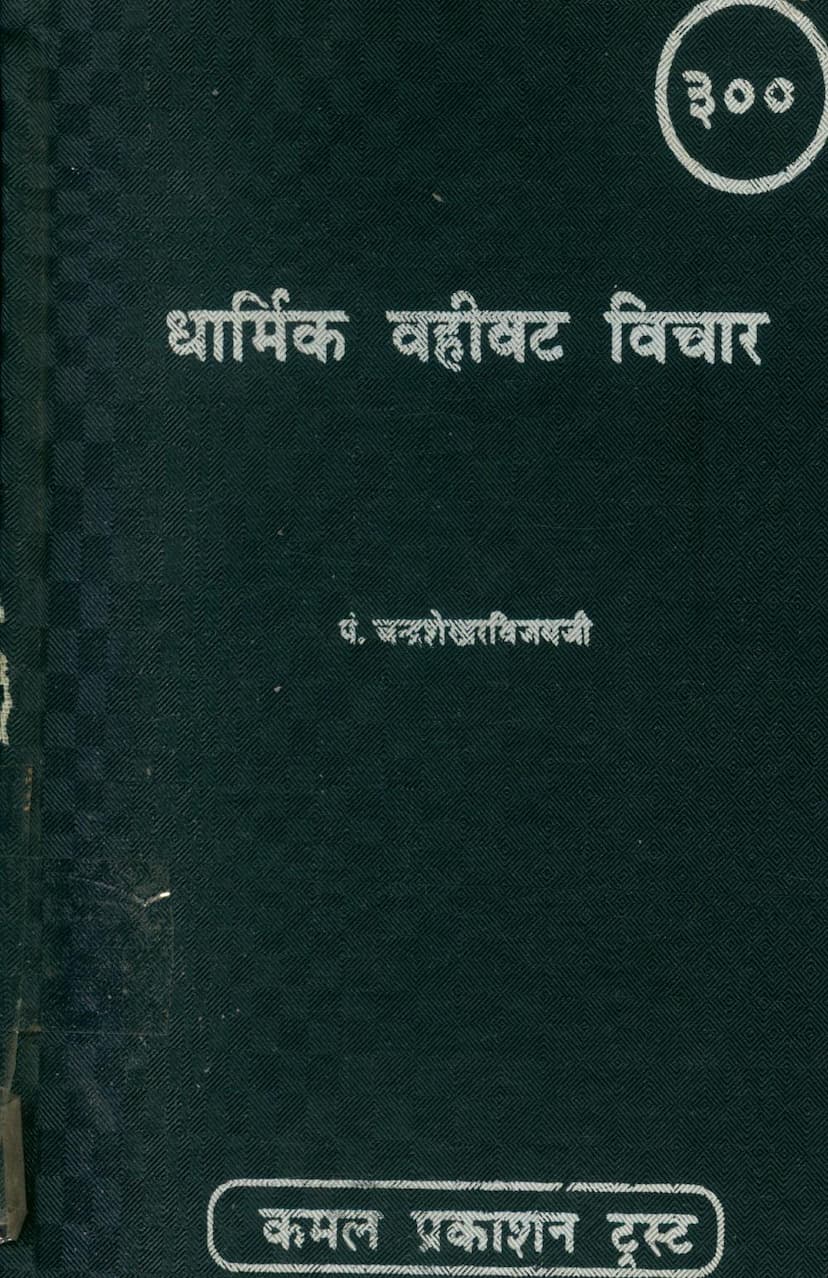Dharmik Vahivat Vichar
Added to library: September 1, 2025

Summary
This Jain text, titled Dharmik Vahivat Vichar (Religious Administration Thought) by Pandit Chandrashekharvijayji, published by Kamal Prakashan, serves as a comprehensive guide to the classical management of Jain religious affairs. It delves into the systematic arrangement of fourteen key areas within Jain religious practice, offering detailed insights and practical advice.
The book is structured into three main sections:
Part One: The Eligibility for Managing Religious Funds
This section lays down the essential qualities and qualifications required for individuals entrusted with the management of Jain religious properties and finances. It outlines the virtues of a suitable trustee, emphasizing:
- Devotion and Integrity: A strong commitment to the faith and honest wealth acquisition.
- Abstinence and Respectability: Complete avoidance of the seven vices and being respected in the community.
- Generosity and Knowledge: Being a donor, performing daily Jin Pooja, and possessing knowledge of scripturally approved methods for increasing temple wealth.
- Adherence to Principles: Following scriptural injunctions and practicing according to one's spiritual stage (gunsthan).
- Ethical Conduct: Upholding righteousness, being merciful, and living a virtuous life.
Conversely, it lists disqualifications, including being non-Jain, having a history of business failure or dishonesty, engaging in unethical practices, imprisonment, adultery, theft, suspension from other organizations, lack of accounting knowledge, greed, lust, and reckless business ventures. The text stresses that proper management leads to spiritual progress and liberation, while mismanagement leads to downfall and severe karmic bondage.
Part Two: Questions and Answers Regarding the Fourteen Areas
This extensive section addresses a wide range of practical questions related to the administration of the fourteen key areas of Jain religious activity. These areas are categorized as follows:
- Devadravya (Deity Wealth) related (1+2): Jinpratima (Idol) and Jinmandir (Temple)
- Discussions cover the creation of idols from various materials, their size, maintenance of broken idols, taking idols abroad, the process of obtaining marble, the use of dream offerings (Swapnadravya), and the use of Devadravya for salaries, maintenance, and even charitable activities like helping the poor. It also addresses issues like idol theft, the concept of Akhand Deep (eternal lamp), and the interest on Devadravya.
- Jinagam (Sacred Scriptures)
- Covers the proper utilization of funds allocated for scriptures, including printing, preservation, and making them accessible.
- Sadhu - Sadhvi (Monks and Nuns)
- Addresses the management of funds related to the care and maintenance of ascetics, including their dietary needs, medical expenses, and living arrangements. It touches upon the ethical use of funds designated for ascetic welfare.
- Shravak - Shravika (Lay followers)
- Focuses on supporting lay followers in need, fostering religious activities, and promoting the welfare of the Jain community.
- Pauṣadhaśālā (Upāśraya - Monastic Lodgings)
- Details the construction, maintenance, and proper utilization of monastic residences, including rules regarding their use for religious and social gatherings.
- Pāṭhaśālā (Schools)
- Discusses the funding and operation of Jain schools, the purchase of religious books, and the importance of imparting religious education.
- Āyambil Division (Special Fasting Rituals)
- Covers the administration of funds for Ayambil meals, including their use for the needy and the maintenance of Ayambil halls.
- Kālakṛta (Time-bound Offerings) and Niśrākr̥ta (Offerings based on Sponsorship/Dedication)
- Explains the management of funds received for specific time-bound religious observances or sponsored activities.
- Anukampā Division (Compassion)
- Addresses the charitable distribution of resources to the needy, including specific guidelines for religious ceremonies and welfare activities.
- Jīvadayā (Animal Welfare)
- Details the use of funds for the protection and care of animals, including the operation of Panjrapoles (animal shelters) and ethical considerations in animal welfare.
The questions and answers are extensive, covering a vast array of specific scenarios and providing scriptural justifications and practical guidance for each.
Part Three: Appendices
This section contains supplementary material:
- Appendix 1: Reflections by Pandit Chandrashekharvijayji on resolutions passed at the 1987 Muni Sammelan (Monastic Conference) in Ahmedabad concerning Devadravya and Gurudravya management.
- Appendix 2: Reflections by Muni Shri Abhayshekharvijayji on Devadravya and Gurudravya, including interpretations of the Shradhhajita Kalpa.
- Appendix 3: Correspondence between revered Jain monks and scholars regarding the use of Devadravya for Jin Pooja, offering diverse scholarly opinions and interpretations.
Overall Themes and Significance:
- Scriptural Foundation: The book consistently grounds its advice in Jain scriptures and the interpretations of learned Acharyas.
- Practical Guidance: It offers practical solutions to complex administrative and financial challenges faced by Jain institutions.
- Ethical Framework: It emphasizes the importance of ethical conduct, transparency, and integrity in managing religious funds.
- Community Welfare: It highlights the responsibility of the Jain community towards its members and the broader society through acts of compassion and animal welfare.
- Debate and Interpretation: The appendices reveal ongoing scholarly discussions and the importance of seeking clarity on scriptural interpretations, especially concerning the use of Devadravya.
In essence, "Dharmik Vahivat Vichar" is a vital resource for anyone involved in the administration of Jain religious institutions, providing a scholarly yet practical framework for upholding the principles and practices of Jainism with integrity and wisdom.